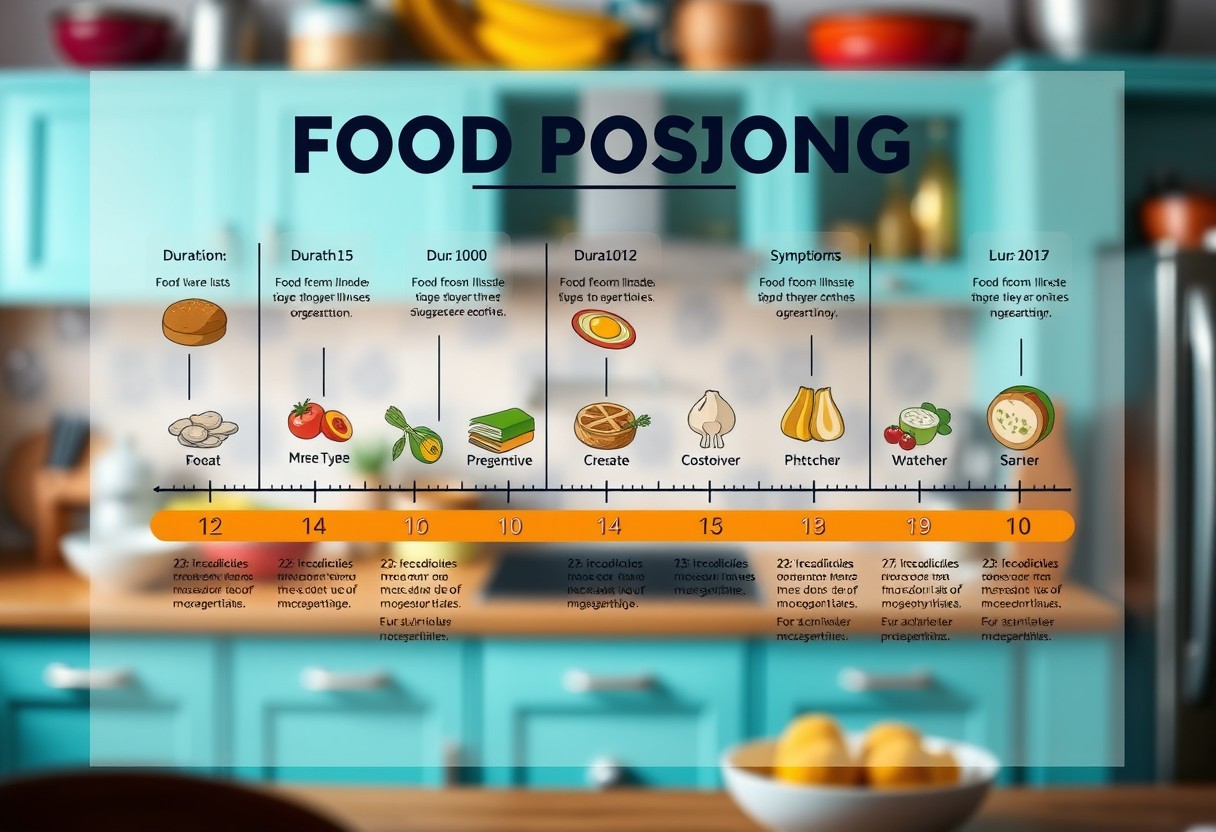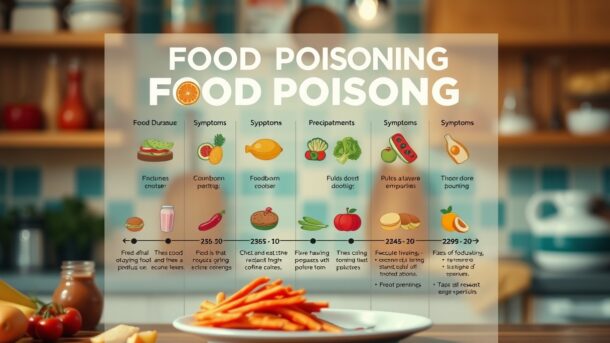With the potential to disrupt your daily life, food poisoning is a prevalent concern that affects countless individuals every year. Understanding how long you can expect symptoms to last is crucial for managing your health and well-being. This guide will explore the various factors that influence the duration of food poisoning, including the type of pathogen involved and your individual health status. Knowing what to look for can help you take appropriate action, ensuring you recover as quickly as possible.
Key Takeaways:
- Duration Varies: The duration of food poisoning can range from a few hours to several days, depending on the type of bacteria or virus involved.
- Common Symptoms: Typical symptoms like nausea, vomiting, diarrhea, and stomach cramps may persist for 24 to 72 hours.
- Severity Matters: Severe cases, particularly those caused by pathogens such as E. coli or Salmonella, can last up to a week or longer and may require medical intervention.
- Hydration Is Crucial: Staying hydrated is important, especially if symptoms last for more than a couple of days, to avoid dehydration.
- Seek Help If Needed: If symptoms persist beyond 5 days or worsen, it’s imperative to consult a healthcare professional for appropriate treatment.
Understanding Food Poisoning
The experience of food poisoning can often be unsettling and inconvenient. It’s vital to recognize what food poisoning entails, its common causes, and how to respond effectively. For a deeper look into How Long Food Poisoning Lasts and What To Do About It, you can follow the link to gain more insights.
Definition of Food Poisoning
One of the most common health issues you can encounter, food poisoning arises from consuming contaminated food or beverages. The contaminants may include bacteria, viruses, or parasites, leading to various symptoms that can affect your wellbeing.
Common Causes
To understand food poisoning better, knowing its common causes is crucial. In most cases, it is the ingestion of food contaminated by harmful pathogens that leads to foodborne illness.
Causes of food poisoning vary widely, but commonly include improper food handling, inadequate cooking, or cross-contamination between raw and cooked foods. Other significant factors include consuming expired or improperly stored foods, as well as seafood that may be tainted with harmful microorganisms. By being aware of these factors, you can take steps to minimize your risk and ensure the safety of your meals.
Duration of Symptoms
There’s no one-size-fits-all answer when it comes to the duration of food poisoning symptoms. The length of time you experience discomfort can vary based on several factors, including the type of pathogen involved, your overall health, and how quickly you receive treatment. For detailed information, you can refer to Food poisoning – Symptoms and causes.
Typical Timeframes
With most cases of food poisoning, symptoms typically appear within hours to a few days after exposure. Generally, your recovery can take anywhere from 24 hours to several days, depending on the specific bacteria or virus causing your illness. You may find that some symptoms, like nausea or fatigue, persist even after the more acute symptoms have subsided.
Factors Influencing Duration
Duration can be influenced by various factors, including the type of pathogen, your age, and any underlying health conditions you may have. Here are some key considerations:
- Type of foodborne pathogen involved.
- Your immune system’s strength.
- Hydration and nutrition during illness.
- Timeliness and effectiveness of treatment.
Knowing these factors can help you better understand your experience and recovery time.
Duration varies not just with the pathogen but also with how effectively you manage symptoms and care for yourself. For instance, staying hydrated can significantly impact your recovery timeline. Here are additional aspects to consider:
- Previous experience with foodborne illnesses.
- Access to medical care.
- Overall lifestyle and health habits.
Knowing these can provide you with a clearer picture of what to expect during your recovery.
Timeframes
Timeframes can vary widely; therefore, it’s crucial to be prepared for a range of experiences. While most symptoms resolve within a few days, some specific illnesses linked to contaminated food sources might have longer-lasting effects. You should remain aware of any persisting symptoms and consult a healthcare professional if necessary.
Types of Food Poisoning
After understanding the effects of food poisoning, it’s important to recognize the different types that can affect your health. Each type of food poisoning has distinct characteristics and can stem from various sources. Below is a brief overview of the major types:
- Bacterial Infections
- Viral Infections
- Parasitic Infections
- Toxin-induced Poisoning
- Chemical Food Poisoning
Knowing the type of food poisoning you may be dealing with can help you seek appropriate treatment and avoid future occurrences.
| Type | Description |
|---|---|
| Bacterial Infections | Caused by harmful bacteria like Salmonella or E. coli. |
| Viral Infections | Often stem from viruses like norovirus or hepatitis A. |
| Parasitic Infections | Involve parasites such as Giardia or Cryptosporidium. |
| Toxin-induced Poisoning | Related to toxins produced by bacteria or found in food. |
| Chemical Food Poisoning | Results from chemicals like pesticides or heavy metals. |
Bacterial Infections
One of the most common causes of food poisoning is bacterial infections. These occur when you consume food contaminated with pathogenic bacteria. Symptoms typically include diarrhea, stomach cramps, and fever. High-risk foods include undercooked meats, dairy products, and unwashed vegetables. Quick intervention is often necessary to manage symptoms effectively.
Viral Infections
Any virus can lead to food poisoning, often resulting in gastrointestinal symptoms. Common culprits include norovirus and hepatitis A, which are highly contagious. These infections can cause nausea, vomiting, and abdominal pain after the consumption of contaminated food or water. Understanding how these viruses spread can help you take preventive measures.
Bacterial pathogens, while a significant concern, are not the only infectious agents. Viral infections can spread rapidly in settings like cruise ships or events where food is shared. Ensuring proper personal hygiene and safe food handling practices can minimize your chances of infection. Regular hand washing and cooking foods to the right temperatures are key preventive strategies.
Parasitic Infections
An additional concern in food safety is parasitic infections, which result from consuming food or water containing parasites. Symptoms may range from mild gastrointestinal discomfort to severe illness. Common parasites include Giardia and Cryptosporidium, often found in contaminated water or undercooked food. Recognizing these sources can help you avoid infection.
Parasitic infections, although less common than bacterial or viral ones, can lead to long-term health issues if not treated. They thrive in unsanitary conditions, making it crucial for you to practice safe food preparation and proper sanitation. By maintaining cleanliness in your kitchen and ensuring that your food is cooked thoroughly, you can reduce your risk of these infections significantly.

Prevention and Management
Your health and safety are paramount when it comes to food consumption. Understanding how to prevent food poisoning can equip you with the tools to safeguard yourself and others.
Safe Food Handling Practices
To prevent food poisoning, always practice safe food handling techniques. This includes washing your hands before and after handling food, cooking meats to the appropriate internal temperatures, and ensuring that perishable items are stored at the right temperatures to inhibit bacterial growth. Regularly clean and sanitize surfaces and utensils to reduce the risk of contamination.
When to Seek Medical Attention
Handling food poisoning can be tricky, as symptoms can vary widely in severity. If you experience severe symptoms, such as high fever, persistent vomiting, or dehydration, it’s crucial to seek medical attention immediately.
Food poisoning can escalate quickly and may lead to serious complications if left untreated. Symptoms that merit immediate medical attention include blood in your stool, prolonged diarrhea lasting more than three days, and signs of dehydration such as dizziness, dry mouth, or decreased urination. Taking prompt action can help you avoid more severe health issues and ensure you receive appropriate treatment.
To wrap up
The duration of food poisoning can vary significantly depending on the type of pathogen involved and your overall health. Symptoms may last from a few hours to several days, and in some cases, complications can prolong your recovery. It’s vital to stay hydrated and consult a healthcare professional if your symptoms persist or worsen. For detailed information on the Symptoms of Food Poisoning | Food Safety, access reliable sources to help you recognize when to seek medical attention.
Q: How long can food poisoning symptoms last?
A: The duration of food poisoning symptoms can vary widely depending on the type of pathogen involved and the individual’s health. Generally, symptoms can last anywhere from a few hours to several days. For most healthy adults, symptoms from common foodborne illnesses like Salmonella or E. coli typically last between 1 to 7 days. However, in some cases, like with Norovirus, symptoms may resolve in as little as 24 to 48 hours. It’s important to stay hydrated and seek medical attention if symptoms persist or worsen.
Q: What factors affect the duration of food poisoning?
A: Several factors can influence how long food poisoning lasts. These include the specific bacteria, virus, or toxin that caused the illness, the individual’s overall health and immune system response, the amount of contaminated food consumed, and whether the person has any underlying health conditions. For instance, young children, the elderly, and those with compromised immune systems may experience longer-lasting symptoms. Additionally, certain pathogens, such as Listeria or Hepatitis A, can lead to prolonged illness and require medical intervention.
Q: When should I seek medical attention for food poisoning symptoms?
A: It’s crucial to seek medical attention if you experience severe symptoms of food poisoning, which may include persistent vomiting, high fever (above 101.5°F), blood in stool, severe dehydration, or if symptoms last longer than 3 days. Additionally, vulnerable populations like pregnant women, infants, the elderly, or individuals with weakened immune systems should consult a healthcare provider promptly. Early medical intervention can help manage symptoms and prevent complications.



